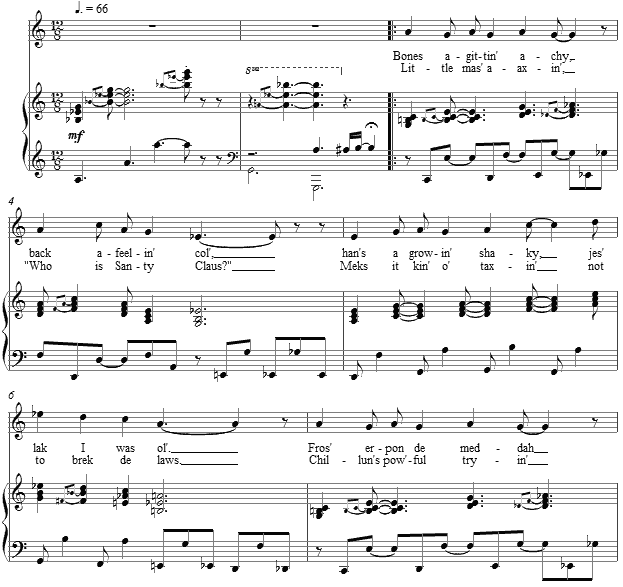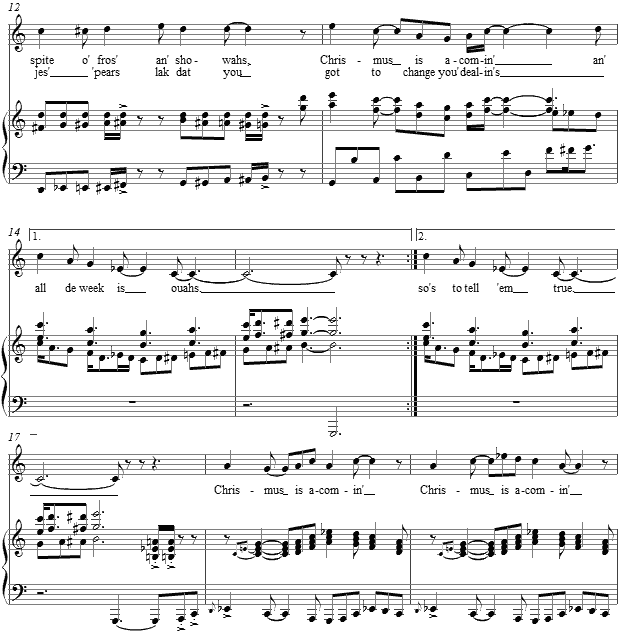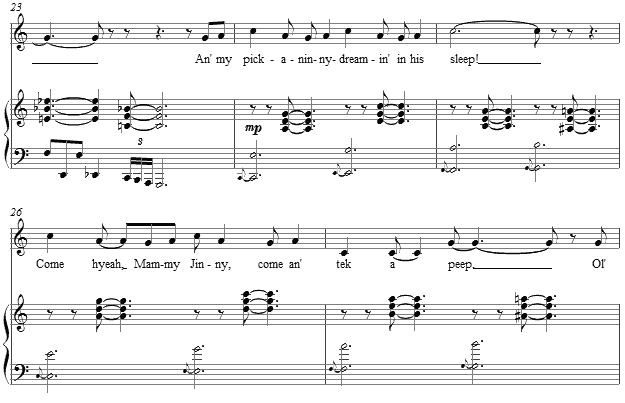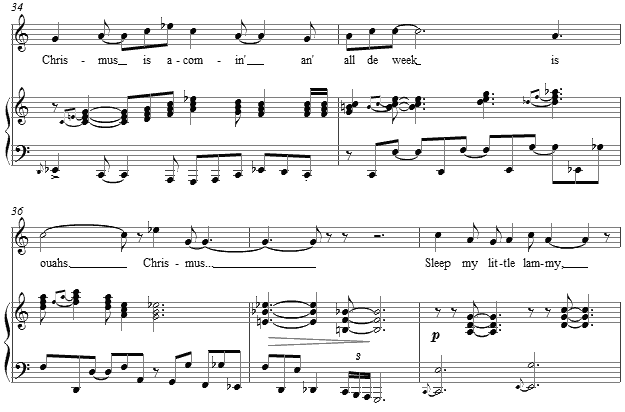Music and Texts of GARY BACHLUND
Vocal Music | Piano | Organ | Chamber Music | Orchestral | Articles and Commentary | Poems and Stories | Miscellany | FAQs
Chrismus Is A-Comin' - (2008)
Paul Laurence Dunbar
for medium voice and piano
Bones a-gittin’ achy,
Back a-feelin’ col’,
Han’s a-growin’ shaky,
Jes’ lak I was ol’.
Fros’ erpon de meddah
Lookin’ mighty white;
Snowdraps lak a feddah
Slippin’ down at night.
Jes’ keep t’ings a-hummin’
Spite o’ fros’ an’ showahs,
Chrismus is a-comin’
An’ all de week is ouahs.
Little mas’ a-axin’,
“Who is Santy Claus?”
Meks it kin’ o’ taxin’
Not to brek de laws.
Chillun ‘s pow’ful tryin’
To a pusson’s grace
W’en dey go a pryin’
Right on th’oo you’ face
Down ermong yo’ feelin’s;
Jes’ ‘pears lak dat you
Got to change you’ dealin’s
So ‘s to tell ‘em true.
An’ my pickaninny—
Dreamin’ in his sleep!
Come hyeah, Mammy Jinny,
Come an’ tek a peep.
Ol’ Mas’ Bob an’ Missis
In dey house up daih
Got no chile lak dis is,
D’ ain’t none anywhaih.
Sleep, my little lammy,
Sleep, you little limb,
He do’ know whut mammy
Done saved up fu’ him.
Dey’ll be banjo pickin’,
Dancin’ all night thoo.
Dey’ll be lots o’ chicken,
Plenty tukky, too.
Drams to wet yo’ whistles
So’s to drive out the chills.
Whut I keer fu’ drizzles
Fallin’ on de hills?
Jes’ keep t’ings a-hummin’
Spite o’ col’ an’ showahs,
Chrismus day’s a-comin’,
An’ all de week is ouahs.[ 7 pages, circa 4' 30" ]
Paul Laurence Dunbar
As with other texts by this American poet, this is written in dialect, and therefore is perhaps difficult for some non-native English speakers to easily understand. Therefore, for that purpose, I append here a "translation" of sorts which in no way can capture the vibrant flavor, spirit and drama of the original. Dunbar wrote both in conventional English and in dialect, with his reputation in his day being based more on his wonderful ability to capture that snapshot of a culture which preserves it beautifully to this day.
Bones are getting achy,
Back is feeling cold,
Hands are growing shaky,
Just like I was old.
Frost upon the meadow
Looking mighty white;
Snowdrops like a feather
Slipping down at night.
Just keep things humming
Spite of frost and showers,
Christmas is coming
And all the week is ours.
Little master's asking,
“Who is Santa Claus?”
Makes it kind of taxing
Not to break the laws.
Children are powerfully trying
To a person’s grace
When they go prying
Right on to your face
Down among your feelings;
Just appears like that you
Have to change your dealings
So as to tell them true.
An’ my pickaninny [ 1 ] —
Dreaming in his sleep!
Come here, Mother Jinny, [ 2 ]
Come and take a look.
Old Master Bob and Missus
In the house up there
Have no child like this one is,
There ain’t none anywhere.
Sleep, my little lambkins,
Sleep, you little lamb,
He doesn't know what mother
Has saved up for him.
There’ll be banjo picking,
Dancing all night through.
There’ll be lots of chicken,
Plenty turkey, too.
Drams to wet your whistles
So as to drive out the chills.
What do I care for drizzles
Falling on the hills?
Just keep things humming
Spite of cold and showers,
Christmas day is coming,
And all the week is ours.
Written for voice of medium range, the setting follows Dunbar's strophic pattern, but repeats the line, "Chrismus is a-comin'" as a refrain. The first two strophes are alike, the 12/8 meter placing the bass line as often syncopated against the harmonic rhythm.
The refrain repeats the enthusiastic single line, "Chrismus is a-comin'," after the second strophe.
The third strophe breaks the repeated eighth note, as the accompaniment settles into a quieter feeling. The child is asleep, dreaming and unaware of the holiday festivities yet to come. This is a moment for the parents and family to muse on the sweetness of such a scene. The tenths in the left hand should not be rushed if difficult to reach for some pianists, but rather the tempo can be slightly slower.
This third strophe is broken by the refrain, such that the gentle "sleep, my little lammy" is the quietest moment of the setting. The final fourth strophe is a repeat of the opening strophes and repeats "Chrismus is a-comin'" as the refrain.
The score for Chrismus Is A-Comin' is available as a free PDF download, though any major commercial performance or recording of the work is prohibited without prior arrangement with the composer. Click on the graphic below for this piano-vocal score.
NOTES
[ 1 ] Pickaninny is today thought of as an offensive word within the circle of those enthusiastic to enforce politically correct notions of speech. Yet in the time in which this poem was written, the word was dialect in use in both black and white communities as simply "small black child."
Its origins from the mid 17th century seem to come most likely from the Portuguese, pequenino, for small child, as spread through the English-speaking Creole culture. One finds similar words, such as Jamaica's pickney, and the West African English, pickin. To apply today's standards -- which will certainly again change -- is false and artistically invalid, as well as an insult to this fine American poet who had not only right to use such vocabulary, but for whom today's notion of politically correct speech would have been unfathomable. My personal reading of his work in general speaks of his love for freedom, and among the notions of such freedom is the freedom to express one's self as one sees proper.
[ 2 ] Mammy, for mother, is used twice in this poem, once capitalized and once in lower case.
The term for mother in dialect is used here capitalized as a title, much as my copy of the Gullah translation, De Nyew Testament (New York, American Bible Society, 2005), shows the grammar of capitalization for "Lawd" and "Fada" as reflects other language traditions.
This translation -- some might prefer to say transliteration -- is done according to the Sea Islands Creole, also known as Geechee, and the translation team calls its various usages "practical orthography." Just so with Dunbar's work more than a century ago. Mammy Jinny is affectionate for Mother Jennifer or Jenny.




